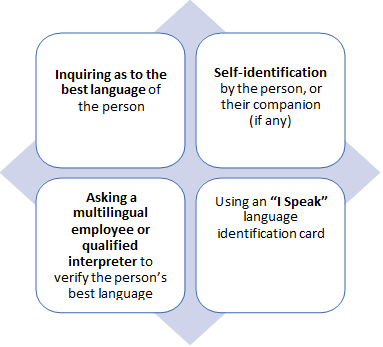G - Provision of Language Assistance Services
EOIR will continue to furnish interpreters at all EOIR proceedings when a party or a witness to a case is an individual with LEP. EOIR will ensure that when an interpreter is present at a proceeding, the interpreter will provide a full and complete interpretation of the proceeding unless waived by the representative of record. Language interpreter services provided at hearings are provided at government expense.
Only staff authorized as interpreters or translators may provide substantive (i.e., direct bearing on a matter) language assistance services on behalf of EOIR. Other multilingual employees may provide basic assistance to people with LEP (e.g., simple instructions at a service window or on the phone and on an informal basis). EOIR may also contract with professional interpretation or translation services to assist EOIR in providing language access for people with LEP. Operating Policies and Procedures Memorandum 04-08 provides guidance to the immigration courts concerning the use of contract interpreters. [11]
When EOIR staff first encounter an LEP person needing EOIR assistance or service, the staff member makes an initial assessment of the need for language assistance services in one of the following ways:
If EOIR staff are unable to identify the best language spoken of the person with LEP, such staff may access telephonic interpretation services to seek assistance in identifying the person’s best language. As part of its training program, the LAWG will work with components to ensure that information on obtaining phone interpretation services is readily available and accessible by all employees who may need to access the interpretation services.
When a person with LEP who appears in person is not able to convey their best language, staff use language identification cards to identify the person’s language need. Staff and other employees whom EOIR may reasonably expect to have contact with people with LEP will keep a copy of these identification cards readily accessible.
If family members, friends, acquaintances, or neighbors are present with the person with LEP, the staff member should limit communicating through them, doing so only to inquire as to the primary language of the person with LEP and should do so only when necessary, preferring to use agency resources like “I Speak” cards. EOIR staff will not substitute family members friends, acquaintances, neighbors, or bystanders for interpretation services that should instead be provided by the agency. Further, EOIR will not substitute witnesses, representatives, or parties to a case for interpreters the agency provides.
Immigration judges also ask parties to a proceeding whether they need an interpreter for the hearing. If the party responds affirmatively, EOIR provides an EOIR-funded interpreter at the hearing.
[11] https://www.justice.gov/eoir/eoir-policy-manual/OPPM 04-08/download

 U.S. Department
of Justice
U.S. Department
of Justice
